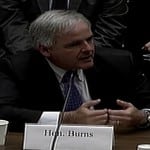The $930.7 million proposal by the Nuclear Regulatory Commission (NRC) to recover 90% of its budget authority through licensing, inspection, and annual fees to be charged to U.S. nuclear generators in fiscal year (FY) 2014 is a 7.7% hike from the year before, but it is “unjustified,” given the decline in the number of operating reactors, a nuclear industry group said last week.
The federal body is required by the Omnibus Budget Reconciliation Act of 1990 to recover about 90% of its budget authority through fees for fiscal year 2014 by Sept. 30, 2014. But the agency’s proposal to increase total fees recovered to $930.7 million, compared to $864 million for fiscal year 2013, suggests that the agency “is not operating efficiently,” Tony Pietrangelo, senior vice president and chief nuclear officer at the Nuclear Energy Institute (NEI) told the agency in a May 12 letter.
Specifically, the NRC has proposed to increase the hourly rate used in assessing full cost fees for specific services, such as inspections, to $279 (compared to $272 in FY2013), citing “higher agency-budgeted resources and a decrease in the number of full-time equivalents compared to FY2013.” However, it has also proposed to adjust current flat application fees to “reflect the hourly rate of $279,” and to increase the total amount of annual fees for generic regulatory costs, not otherwise recovered in other fees, to $594.4 million—an increase of $82.8 million from FY2013.
That means, according to the NEI, the annual fee for each reactor is $5.3 million, up 21% from FY2013.
The agency plans to publish the final fee rule no later than June 2014, and the fee schedules for FY2014 will become effective 60 days thereafter.
But Pietrangelo took issue with the timing of the fee increase, noting that the proposed fee schedule was published in April—a month “later than usual and well after facilities have established their budgets for the coming year.”
The budget increase appears to be driven in in part by “the disproportionately large” increase in the portion of the agency’s total budget spent on overhead—46% in 2014, he said. And while the NRC has increased overhead expenditures, it has reduced funding allocated to activities directly related to its mission.
“In today’s fiscally constrained environment . . . continued growth in NRC’s budget and staff levels—and the concordant increase in fees—is not a sustainable approach,” Pietrangelo said as he asked the NRC for a more detailed explanation of the basis for its proposed resource allocations before finalizing the feel recovery rule.
—Sonal Patel, associate editor (@POWERmagazine, @sonalcpatel)










